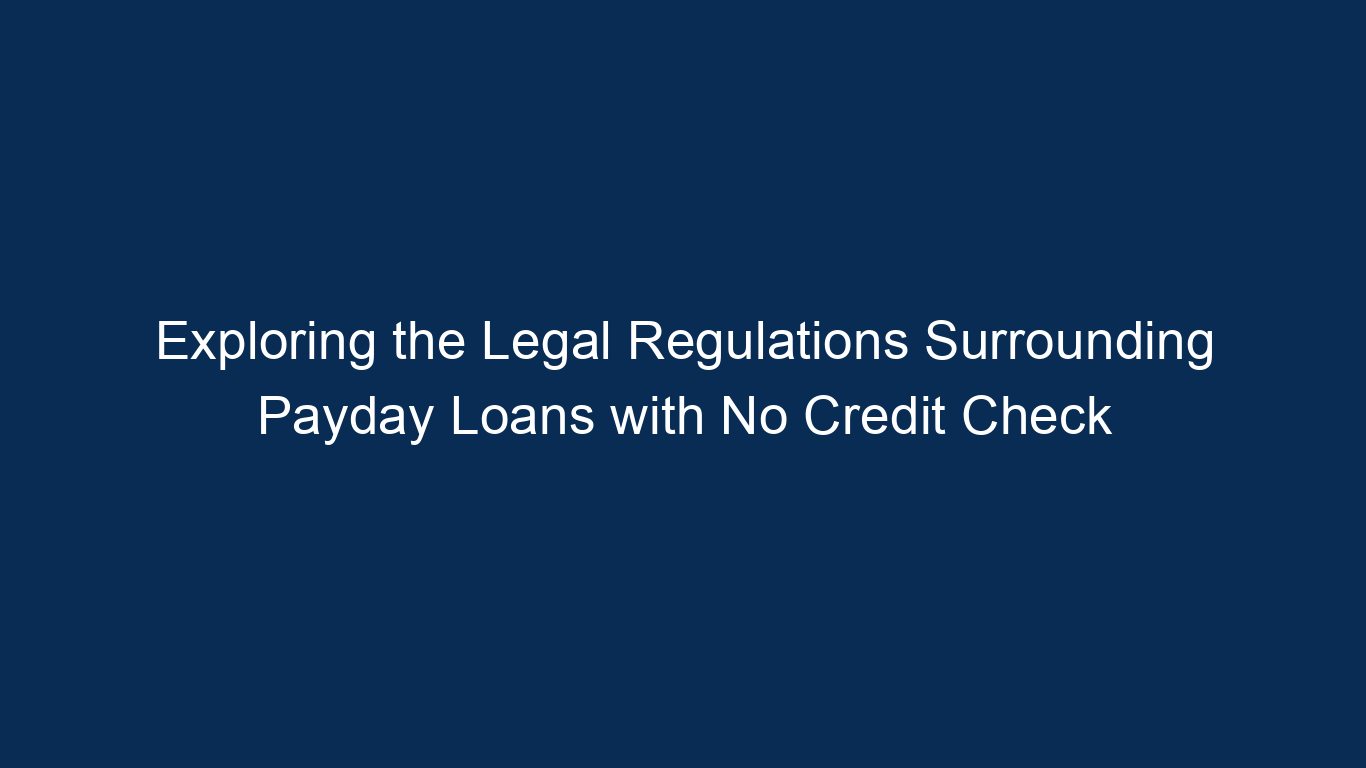Payday loans with no credit check
**Introduction**
When faced with unexpected financial emergencies, many individuals turn to payday loans with no credit check as a viable solution. These loans provide quick access to funds, allowing borrowers to address immediate financial needs. However, it is essential to understand the legal regulations surrounding these loans to ensure consumer protection and prevent potential exploitation. In this article, we will explore the legal landscape of payday loans with no credit check, shedding light on the rights and responsibilities of both borrowers and lenders.
**What are Payday Loans with No Credit Check?**
Payday loans with no credit check are short-term loans that allow individuals to borrow a small amount of money, typically ranging from $100 to $1,500, with no requirement for a credit check. These loans are designed to be repaid on the borrower’s next payday, usually within two to four weeks. Unlike traditional loans, payday loans with no credit check often have higher interest rates and fees due to the perceived higher risk associated with lending to individuals with poor credit or no credit history.
**The Legal Framework for Payday Loans with No Credit Check**
- **State Regulations**
The legal regulations surrounding payday loans with no credit check vary from state to state. Some states have strict regulations in place to protect consumers, while others have more lenient laws that allow for greater flexibility in lending practices. It is crucial for borrowers to familiarize themselves with the specific regulations in their state to ensure they are not being taken advantage of by unscrupulous lenders.
- **Interest Rate Caps**
Many states have implemented interest rate caps on payday loans to prevent excessive interest charges. These caps limit the amount of interest that lenders can charge, ensuring that borrowers are not burdened with exorbitant repayment amounts. However, it is important to note that some states do not have interest rate caps in place, which can leave borrowers vulnerable to predatory lending practices.
- **Licensing and Registration**
To operate legally, lenders offering payday loans with no credit check are required to obtain the necessary licenses and registrations. These requirements vary by state and are intended to ensure that lenders adhere to ethical and responsible lending practices. Borrowers should always verify the legitimacy of a lender by checking their licensing and registration status before entering into any loan agreement.
- **Disclosure of Terms and Conditions**
Lenders of payday loans with no credit check are obligated to provide borrowers with clear and transparent information regarding the terms and conditions of the loan. This includes the interest rate, fees, repayment schedule, and any potential penalties for late or non-payment. It is essential for borrowers to carefully review these terms and conditions before accepting a loan to avoid any surprises or hidden costs.
**Consumer Protection and Rights**
- **Fair Debt Collection Practices**
Borrowers of payday loans with no credit check are protected by the Fair Debt Collection Practices Act (FDCPA), which prohibits abusive and unfair debt collection practices. This act ensures that borrowers are treated fairly and respectfully by debt collectors, preventing harassment or intimidation tactics.
- **Right to Cancel**
In some states, borrowers have the right to cancel a payday loan within a certain timeframe without incurring any additional fees or penalties. This allows individuals to reconsider their decision and seek alternative solutions if they feel they have made an impulsive or uninformed choice.
- **Regulatory Agencies**
Various regulatory agencies, such as the Consumer Financial Protection Bureau (CFPB), oversee and enforce the laws and regulations surrounding payday loans with no






